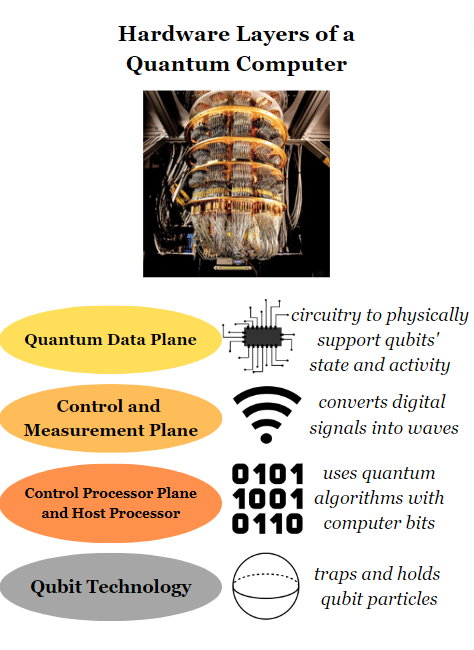Introduction to Fintech
Financial technology, abbreviated as “fintech,” delivers financial services digitally to consumers. Fintech manages financial operations, transactions, and processing with specialized software for businesses (Kagan, 2023). Initially used in the internal processes of banking, fintech is now being implemented by HSBC Bank, Barclays, and many other companies as the “middle man” between banks and third parties in customer interactions to make monetary transfers more efficient. A prominent example of a fintech bank is Capital One with its intelligent assistant Eno that answers user questions, sends fraud alerts, and assumes basic banking responsibilities. Another example is American Express’s Accertify Device Intelligence, which uses two-factor authentication and device integrity testing to provide secure platforms for e-commerce (Schroer, 2023).
What Is Quantum Computing?
Quantum computing uses quantum mechanics and subatomic particles to store data. Traditional computers use bits for information storage (“0” or “1”) while quantum computers use qubits, which can be “0” and “1” simultaneously, allowing quantum computers to operate faster. To aid qubits in overcoming disturbances from the environment, engineers at the University of Washington used semiconductor flakes to build a stable, fault-tolerant qubit (Urton, 2023). These qubits are in a “fractional quantum anomalous Hall” state, meaning they do not require large magnetic fields to stay stable and are thus viable for quantum computing.
Quantum Computing Applications in Fintech
Quantum computers are leveraged in optimizing investment portfolios. With their ability to perform mathematical calculations exceptionally fast, quantum computers use Grover’s and Shor’s algorithms (which are unstructured data searches that can categorize data organized qualitatively, not quantitatively) in developing strategies to maximize revenue while minimizing loss (Bassi, 2023). IBM has identified two more major roles that quantum computing can play in the finance industry. To avoid smaller financial institutions from losing customers because of a lack of targeted services, quantum computing can parse through great volumes of behavioral data to predict user needs. With ETF volatility increasing (to reach USD two billion by 2024), in the market, quantum computing can propose models of diversifying portfolios (IBM Institute for Business Value).
Security Threats and Limitations of Financial Institutions
In 2021, financial institutions experienced 22.4% of total cyber attacks. The primary security threats these institutions face include ransomware, spoofing, and denial of service (DoS) attacks (Ozarslan, 2022). Ransom organizations access files in vulnerable banking systems, encrypt the data within these files, and extort ransom in return for a decryption key. Regarding spoofing, cybercriminals recreate banking portals and collect the personal information that a user enters. Spoofing can replicate so exactly that individuals using the correct URLs to access their banking portals can be victims. DoS attacks occur by flooding a financial institution’s website with traffic, causing the system to crash and users to be unable to access their funds (imagine driving a car when a bunch of leaves blow onto the windshield, obscuring your visibility). These security threats contribute to the total one trillion data breaches in the finance sector.
Quantum Computing and Fintech for Improvement
While quantum computing can compromise security because of its ability to rapidly decrypt data, it has the potential to strengthen security as well. Quantum computing uses two types of encryption: symmetric encryption, where the encryption and decryption keys are the same, and asymmetric encryption, which uses a public key for encryption and a different private key for decryption (Rjaibi, 2018). Quantum key distribution is a safe method of exchanging these keys by sending photons (light particles) over a fiber optic cable up to one hundred kilometers. This method is also resilient to passive cyber attacks (Rathnayake, 2023). With respect to cryptography, “random number generators” rely on algorithms that are not truly random, placing them in danger of cyber attacks (think of these algorithms as using the same formula to generate different numbers; once the formula is cracked, so is the generated number, right?). Therefore, the companies Quantum Dice and IDQuantique are developing quantum generators for true randomness (Lipman, 2021).
Conclusion
Even if financial institutions are not equipped to transfer fully to quantum equipment, hybrid systems allow classical computers to pass difficult computations as well as cyber risks off to quantum counterparts. Overall, quantum computers can play a role in both advancing the financial ability of institutions while protecting them.

References
Kagan, Julia. (2023). Financial Technology (Fintech): Its Uses and Impacts on Our Lives. Investopedia. https://www.investopedia.com/terms/f/fintech.asp.
Schroer, Alyssa. (2023). Fintech Banking: 17 Fintech Banks and Neobanks to Know. Built In. https://builtin.com/fintech/fintech-banking-examples.
Urton, James. (2023). Researchers Make a Quantum Computing Leap with a Magnetic Twist. UW News. https://www.washington.edu/news/2023/06/27/fqah-states/.
Bassi, Eleonora. (2023). How Does Quantum Computing Impact the Finance Industry? Cointelegraph. https://cointelegraph.com/explained/how-does-quantum-computing-impact-the-finance-industry.
Exploring Quantum Computing Use Cases for Financial Services. IBM Institute for Business Value. https://www.ibm.com/thought-leadership/institute-business-value/en-us/report/exploring-quantum-financial.
Ozarslan, Dr. Suleyman. (2022). Key Threats and Cyber Risks Facing Financial Services and Banking Firms in 2022. Picus Labs. https://www.picussecurity.com/key-threats-and-cyber-risks-facing-financial-services-and-banking-firms-in-2022.
Rjaibi, Dr. Walid, Dr. Sridhar Muppidi, Mary O’Brien. (2018). Quantum Computing and Cybersecurity: How to Capitalize on Opportunities and Sidestep Risks. IBM Institute for Business Value. https://www.ibm.com/thought-leadership/institute-business-value/en-us/report/quantumsecurity.
Rathnayake, Dilki. (2023). The Impact of Quantum Computing on Cybersecurity. Fortra. https://www.tripwire.com/state-of-security/impact-quantum-computing-cybersecurity.
Lipman, Paul. (2021). How Quantum Computing Will Transform Cybersecurity. Forbes. https://www.forbes.com/sites/forbestechcouncil/2021/01/04/how-quantum-computing-will-transform-cybersecurity/?sh=3809854a7d3f.
